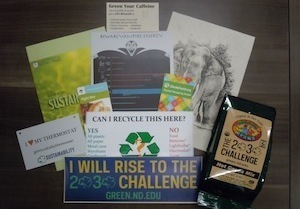
Over the past few weeks, you may have noticed friends and colleagues on campus sporting reusable shopping bags, sipping organic hot chocolate, and waxing eloquent on the subject of sustainable seafood. The source of their newfound gear and inspiration is a recent initiative called the Sustainability Toolkit.
The Toolkit is being distributed by the Office of Sustainability to members of the campus community who take the 2030 Challenge, indicating their support for the University’s recently adopted sustainability strategy. The Toolkit contains useful information such as where to find discounts for bringing your own coffee mug to campus cafés, how your thermostat is supposed to work and what to do if it’s broken, and which seafood is the most responsible choice on the dinner menu. During the winter season, the Toolkit also contains a package of organic, fair-trade hot chocolate.
“We have tried to customize the Toolkit as much as possible,” said Rachel Novick in the Office of Sustainability. “For example, faculty members receive information on how to bring sustainability into the classroom. Students who indicate interest receive information on the new Minors in Sustainability and Energy Studies. Each recipient gets an explanatory card to hang on the thermostat that is specific to the heating system in that particular building. Our goal in this program is to make sustainability practical and relevant to everyday life on campus.”
The Toolkit’s popularity has taken off quickly: over 150 have been distributed so far and new requests come in every day. “I found the energy card and wallet guides very informative, providing me with more environmentally conscious energy/food/product choices,” said Margaret Cinninger, Administrative Assistant in the Medieval Institute. “My favorite item in the toolkit is the seafood guide,” added Julia Sama, Program Director in the Office of Continuous Improvement. “I didn’t realize there were so many fish to avoid – many of them because of the impact the fishing methods have on the sealife environment. I have already referred to the seafood guide a few times.”
Those wishing to receive a Toolkit are encouraged to take the 2030 Challenge, which includes a pledge to adopt more sustainable behaviors as well as opportunities to provide feedback about specific interests. Students can be connected to environmental clubs or learn about sustainability programs in their residence hall and around campus. Staff can join the Green Ambassadors program, while faculty in science and engineering can sign up for the greeNDiscovery lab efficiency program. All those who take the Challenge will receive the Office of Sustainability e-newsletter, which will keep them updated on sustainability initiatives and opportunities to get involved.